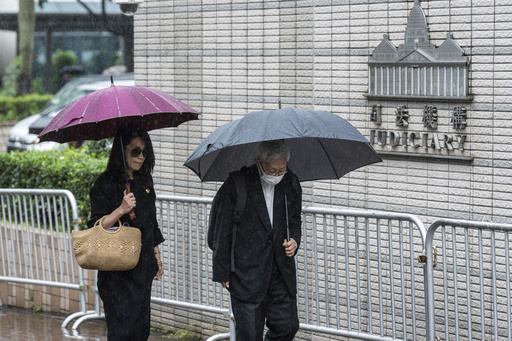
HONG KONG — Former publisher Jimmy Lai firmly refuted allegations that he instructed an associate to create a list of potential individuals for sanctions during his second day of testimony at his high-profile national security trial in Hong Kong.
The 77-year-old, who founded the now-defunct pro-democracy newspaper Apple Daily, faces grave charges of colluding with foreign entities to jeopardize national security and conspiring to disseminate seditious material. His arrest took place in 2020 amidst a governmental crackdown following extensive anti-government demonstrations in 2019. Should he be found guilty, Lai could receive a sentence of up to life in prison.
During the court proceedings, a WhatsApp conversation between Lai and Chan Pui-man, the former associate publisher of Apple Daily, was brought to light. Chan was among six previous executives of the newspaper who admitted to conspiring with Lai to advocate for sanctions or other hostile actions against either Hong Kong or mainland China.
Lai’s attorney, Steven Kwan, presented these text messages after Chan claimed earlier in the trial that Lai had suggested the newspaper compile a sanctions list following an order from then-President Donald Trump, aimed at punishing individuals deemed responsible for undermining civil liberties in Hong Kong.
On the stand, Lai stated that he did not author the contentious message but merely copied and pasted it from someone he believed to have ties to the White House. Moreover, he mentioned that he did not fully read the contents of the text before sharing it, describing it as “sounds so foreign to me.”
Kwan noted that Lai forwarded the same message to several pro-democracy politicians, including Lee Wing-tat. When quizzed on whether he meant to ask Lee for assistance in preparing such a list, Lai responded by calling the idea “ridiculous.”
Following the introduction of the national security law in June 2020, the Trump administration imposed sanctions on officials in Hong Kong who were accused of collaborating with Beijing to undermine the region’s autonomy and suppress freedoms. The national security law has since been utilized to prosecute Lai and other prominent activists. Under its constraints, myriad civil organizations ceased operations, and many activists had to flee into exile. The closure of Apple Daily occurred in 2021 after the arrests of multiple senior figures within the company.
Observers of the situation argue that the significant political transformations represent a contraction of the liberties that were promised to be preserved in the former British territory upon its return to Chinese governance in 1997. However, both the Beijing and Hong Kong administrations assert that the law has reinstituted stability in the city following the events of 2019.
The court session also revealed that Lai had previously advised his international news team to refrain from critiquing Trump back in 2020, while they were seeking his intervention against the national security law. Lai testified that he did not interfere with the journalists’ modus operandi until the law became a looming threat.
When asked on the previous day how he believed Trump could provide assistance, Lai suggested that it might be “a call to China, a call to Xi Jinping,” referring to the Chinese leader. He maintained that his newspaper could not endure the pressure of the national security law but reiterated that he never communicated directly with Trump.
